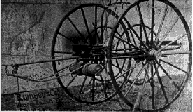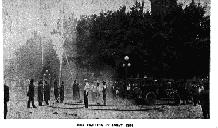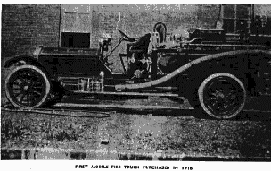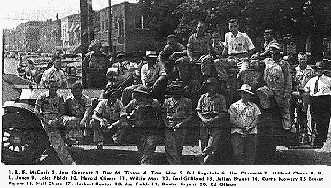The Cleveland
Fire Department grew from very small beginnings. A study of the old minute
books of the City of Cleveland discloses the fact that for many years the
Cleveland volunteer fire fighters had no official recognition, and
consisted only of interested citizens who volunteered their services for
fighting fires as best they could with only the equipment they could carry
such as buckets and quilts. Most of the time the only financial aid they
had was the money they donated out of their own pockets.
The old minute books of the City also show that on January 8, 1895, J.H. Hardwick President of Hardwick Stove Company, was sworn in as Mayor
of Cleveland. From this date thru December 1895, the Board of Mayor and
Aldermen held several meetings pertaining to the installation of fire
hydrants in the city and the purchasing of hose, hose reels, nozzles, and
other necessities including a hook and ladder truck to equip a fire
department. Also during these meetings a committee was appointed to rent a
house for the fire hall "at an annual rental not exceeding fifty
dollars."
 The
first rolling equipment the fire department had was a hose reel which
carried 500 feet of rubber hose, two lanterns and a bell . This piece of
equipment had a tongue and ropes and was pulled by men until 1898 when the
tongue was replaced by shafts and the reel became horse-drawn.
The
first rolling equipment the fire department had was a hose reel which
carried 500 feet of rubber hose, two lanterns and a bell . This piece of
equipment had a tongue and ropes and was pulled by men until 1898 when the
tongue was replaced by shafts and the reel became horse-drawn.
In January 1896, under the direction of a new Mayor, Gus Cate, the
board "agreed to purchase the hose, reels, nozzles and other
equipment from the Revere Rubber Company of New Jersey for the amount of
$1165.00." Also on this date a committee was appointed to buy 125
feet of ladders and a truck to be equipped as a hook and ladder truck.
Records indicate that in the year 1898, there were two fire companies
in Cleveland. Fire companies were the people who were allowed to use the
equipment in the event of a fire. However, before they could use the
equipment, the property owners of the property that was being protected
had to be liable to the Water Company for all water used. Also during this
year the reel carts were altered to be pulled by horses rather than men
and the firemen raised money to buy their first rubber uniforms.
As close as we can determine, on February 14, 1899 Will O. Horner
became Chief of the Fire Department.
"On May 13, 1901, an ordinance was enacted providing that when
fire companies 1 and 2 were called out, the City would pay the firemen
$2.00 if it was necessary to throw water and $1.00 otherwise." In
that same month a motion made to purchase a combination chemical and hose
wagon was defeated. Shortly afterward a fire of serious nature occurred
and a special meeting was called. Authorization was then given to purchase
the wagon. The price of the wagon was shown to be $1600.00.
Cleveland's early alarm system of shots and whistles steadily
progressed to the ringing of a bell in 1896. The bell was placed at the
Courthouse and when there was a fire the bell sounded and aroused a
fireman who then connected to a telephone hookup cranked his telephone and
rang all the other firemen's telephones at the same time. In 1901, about
16 fire boxes, powered by batteries in the basement of the Courthouse,
were added in the streets and would strike the alarm numbers in every
fireman's home.
1904 was a significant year for the department. On
December 12, 1904, Cleveland's first fire ordinance was passed. The
ordinance gave the department authorization to make rules and regulations
and gave the Chief police power in connection with fires. Firemen and
apparatus were also given the right-of -way over streets and alleys. The
fire department also consolidated the two existing volunteer companies
into one company of not more than 15 members, including a chief to be
elected by vote of the firemen.
 In 1906, Mayor
S.A.
Heartstill and his board bought two horses for the fire department and
Chief W.O. Horner was cautioned not to grease the fire department
harnesses more than four times a year. Also in 1906, the City also
received its first two horse fire truck. It was a modern piece of
equipment for its time and was equipped with both hose and chemicals for
fire extinguishment.
In 1906, Mayor
S.A.
Heartstill and his board bought two horses for the fire department and
Chief W.O. Horner was cautioned not to grease the fire department
harnesses more than four times a year. Also in 1906, the City also
received its first two horse fire truck. It was a modern piece of
equipment for its time and was equipped with both hose and chemicals for
fire extinguishment.
In 1908, a bronze fire bell (now on display at the Bradley County Court
House) was hung in the Bradley County Courthouse and by 1911 the City had
a total of 65 fire hydrants.
On August 12, 1915, a $15,000 bond was issued for
constructing a city hall (which is now located between 1st and 2nd
Streets) and equipping a fire department. The price for the lot was $3,000
and the contract for the building was $9,153.00. In December of 1915,
authorization was given to purchase Cleveland's first motor driven piece
of fire equipment. It was a Type 75 Triple Combination Motor Fire Engine
from American La France Engine Company and its cost was $9,000 (almost as
much as the cost of the city hall).
 In June of 1916, it was
reported that the truck had been delivered and accepted. The driver of the
apparatus (J. Stephenson) was given a salary of $50 per month, plus free
rent, lights, water, and heat. In July of the same year J. Stephenson
resigned as fire truck driver and Robert Chase was appointed as driver. [It
should be noted that Robert Chase's grandson, Rob Chase, is still employed
with the Cleveland Fire Department and currently holds the rank of
Captain.]
In December of 1916 an ordinance was enacted providing for a volunteer
fire company of not more than eleven members including a chief who would
be elected by the Board of Mayor and Aldermen and would serve a two year
term at a salary of $10.00 per month and each fireman would receive $2.50
for every fire attended. The chief was also given authority to appoint his
assists.
In June of 1916, it was
reported that the truck had been delivered and accepted. The driver of the
apparatus (J. Stephenson) was given a salary of $50 per month, plus free
rent, lights, water, and heat. In July of the same year J. Stephenson
resigned as fire truck driver and Robert Chase was appointed as driver. [It
should be noted that Robert Chase's grandson, Rob Chase, is still employed
with the Cleveland Fire Department and currently holds the rank of
Captain.]
In December of 1916 an ordinance was enacted providing for a volunteer
fire company of not more than eleven members including a chief who would
be elected by the Board of Mayor and Aldermen and would serve a two year
term at a salary of $10.00 per month and each fireman would receive $2.50
for every fire attended. The chief was also given authority to appoint his
assists.
Below are a few more events that took place in the next few years:
1. In April of 1919, the Chief's salary was increased to $25.00 per month.
2. In May of 1920, authorization was given to purchase the first power
starter for the city fire truck.
3. In November 1921, authorization was given to purchase one gas mask for
the fire department.
A survey of Cleveland, made in 1927 by Lockwood-Greene & Company
Inc., reported that the fire department had only three paid members, a
chief and two drivers. The rest of the department consisted of an
assistant chief, a captain, and 12 volunteer firemen. The equipment they
had was listed as two 750 gpm American La France combination pumpers, and
a Gamewell fire alarm system with 36 boxes.
 In
1940, the department was serviced by 204 fire hydrants connected to the
city's water main. The department had two fire engines, with a combined
total of 4,500 feet of hose. The department was composed of a fire chief (L.F. "Scrubby"
McDaris), two drivers (Jess Chesnutt, and George
Wagner), and twelve firemen (Curtis Mowery, Lake Fields, Millard Chase,
Neil Chase, Ralph Riden, Wilsie May, Francis Geren, Earl Gilliland, Ed
Gibson, Ernest Bryant, Harold Climer, and Sneeny White).
In
1940, the department was serviced by 204 fire hydrants connected to the
city's water main. The department had two fire engines, with a combined
total of 4,500 feet of hose. The department was composed of a fire chief (L.F. "Scrubby"
McDaris), two drivers (Jess Chesnutt, and George
Wagner), and twelve firemen (Curtis Mowery, Lake Fields, Millard Chase,
Neil Chase, Ralph Riden, Wilsie May, Francis Geren, Earl Gilliland, Ed
Gibson, Ernest Bryant, Harold Climer, and Sneeny White).
The department began the 60's with four full time men, and by the
beginning of the 70's had 18 full time men and 22 volunteers. Their
equipment included 5 pumpers, a sixty-five foot aerial ladder truck, and a
service truck. During the last decade, 4 new fire trucks were added, 2 new
stations built, and all firemen had uniforms. There are now three fire
stations, one located on South Ocoee Street, one on Harry Dethro Blvd.,
and the Keith Street station which was completed in 1969. Also on January
13, 1969 Bill Ragsdale became the first full time Fire Chief, J.W. Dodd
became the Fire Safety Inspector, and Gene Lewis was appointed as Training
Officer.
The Chiefs of the Cleveland Fire Department in order up until today are
M.P. Hawk, W.O. Horner, Will Wells, Lawrence (Scrubby) McDaris, William V.
(Bill) Ragsdale, David W. May Jr., Robert
W. (Bob) Gaylor. For more information on these Chief's Click
here.
Today's fire department continues a steady pace of progress under the
leadership of City Manager, George Woods, Fire Chief, Bob Gaylor, Mayor,
Tom Rowland, and the Cleveland City Council. All personnel are
well-trained and the equipment is kept in optimum condition. We are
currently in the process of building a new fire station and receiving a
new Pierce aerial ladder as well as a Pierce 1500 gpm pumper. We would
like to extend our thanks to all the people who have made our success
possible and with their continued support our future looks bright.
Some of the information
and photos in this history was taken from James F. Corn's book Firefighting
in Cleveland available at the history branch of the Cleveland Public
Library.